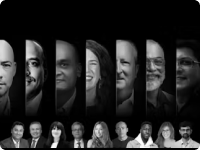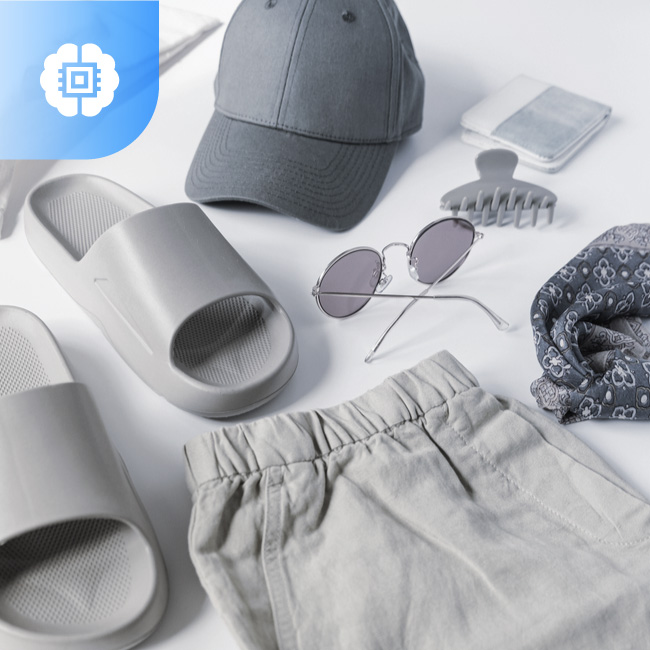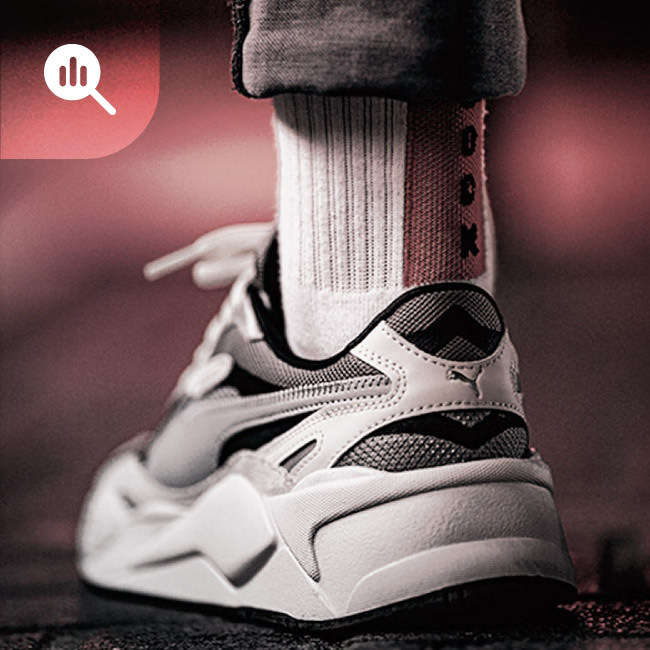
Debunking The Biggest Myths About Personalisation With Radius Tech
About this Podcast:
Did you know that customers are willing to pay up to a 16% premium for great shopping experiences? The question is though, how does the retailer know what the consumer is seeking in terms of experience? How can they provide memorable, personalized experiences that are tailor-made to what their customers are looking for? Burak Capli is the Founder of Radius Tech, a company that focuses on the smart usage of Big Data for improving customer experience in retail and fashion. Radius aims to understand consumer intent and translate it into actionable insights for retailers.
Episode Transcript:
Akshara Subramanian
Hi everyone. Welcome to a new episode of The Retail Podcast by Vue.ai as we continue to explore conversations with brands that are shaping up the future of fashion. We realize that there have been some incredible insights on here. For those of you who haven't tuned in yet, we've been featuring leaders who are changing the game in retail, whether it's companies like Yerdle, Mercado Libre, TATA CLiQ or many other fashion brands that are really moving the needle. We're having conversations with retailers that are really pushing the boundaries when it comes to customer experience, innovation and technology and changing legacy systems that just don't work anymore. And I think one of the biggest things that are really impacted how retailers are functioning is AI. We've talked about data-driven business decisions, automating processes and creating experiences at a large scale using technology. And a company like Radius totally fits into the space of personalized fashion. So without further ado, I'd love to introduce Burak Capli, the founder of Radius Tech Fashion Services. Welcome, Burak.
Burak Capli
Hi Akshara, Thank you for having me. It's an honour to be here and talking to you about these interesting topics. Thank you.
Akshara Subramanian
Fantastic. It's great to have you on our podcast as well. So, Burak, I didn't want to spoil it for our listeners, but I'd love for you to talk about how radius came about and what problem you were really trying to solve.
Burak Capli
Well, it's actually a long story, but I'm going to try to keep it as short and as interesting as possible. So I guess we're a startup and we are kind of a boutique in terms of being flexible and we adapt to the changes in the industry as quickly as possible. And I think that the start of the story explains everything better than anything else. So I was back in my hometown in Turkey until the age of 18. And then I came to London and back home. I was coming from a privileged background. And I didn't need to explain myself to anyone. But then coming to London, where you're nobody no one knows your background. No one knows your family. Meanwhile, There were new technologies coming up. And so I found my path in this technology company that we were producing 3D printers and it was a disruptive technology and we had to launch it into the market. So while I was building my self-identity, I was building the image of this new technology and the main conversation was happening on Instagram because that was the hype around back down and the people were defining themself on that platform as well as the companies. So this gave me a perspective of how people define themself and how they consume stuff. And these all over time, with my experience, lulled into Radius and then comes what's Radius is? Radius basically understands the consumers, defines what their interest, defines what inspires them more importantly. And then they translate this into information so that retailers can act upon it. And I guess as you would have heard about it many times, this is one of the biggest problems that retailers have used to do. Consumers would be inspired or get information directly from the brand or the magazine or something that the retailer or the brand had the power off. But now it has shifted, the consumer chooses where to get the information and how to be inspired. And because the brands don't have control over it, they are really indeed in need of someone, an intermediary, to translate what the consumers want and what they can offer. So the communication could be facilitated. And that's exactly what Radius does. Do we understand? We listen to the consumers and we listen to brands and we tell them, look, these are your consumers. If you want to engage with them in a valuable context, you need to facilitate these things. And that's mainly our experiential strategy.
Akshara Subramanian
It's interesting you said that about consumer experience because I was reading Accenture's personalization pulse report recently and they were talking about how consumers don't really want brands to define their journeys, but they want brands to offer experiences that can help them carve their own paths like they want to be able to enjoy that level of personalization themselves. Right. So how accurate do you think that is? Ninety-one per cent of shoppers are more likely to shop with brands who offer them very relevant things. Do you as somebody who is building a model based on personalized, you know, in-store and physical experiences, do you think that's accurate?
Burak Capli
Oh, well, that's a brilliant question. Because personalization is I guess conceived in a really strong way. So, for example, one of the biggest e-commerce platforms they show me is a specific product, just because I bought the same product. It doesn't mean I'm going to buy it over and over again. I need to buy the complementary stuff. So personalization is understanding well, what I do as a consumer and how I can improve my experience, how they can improve my experience as a retailer. And I guess the personalization of just bringing something in front of a consumer is not enough. The best example is Netflix. They love the recommendation engine that Netflix provides because it gives the reasoning behind the personalization saying because you have watched these movies, we found these other content relevant to you. But on the other hand, the other platforms. they do the personalization without giving any reasoning. And that people feel, oh, I didn't want to share this private information with you. Now, if you're acting upon it, you have to show me the reasoning or how you get this information. So, yeah, the consumers definitely want personalization, but how the brands and retailers present it, is much more important than personalizing the experience. Because I need to feel comfortable and I need to feel that I'm valued as a consumer. when the retailer does a personalization? I still just feel that they are exploiting me, by using my data, I think that's a sweet spot to say we personalize your experience not just because we want to make more money because we value you and we share some common ground with you. And that comes from not just the product level, comes to the values and the vision we have as a brand. And you have to pass that. You have to convey that to the consumers very clearly. And you need to ground the personalization efforts with respect to that shared values and vision.
Akshara Subramanian
Right. I think what you see in my personalization is quite true because it's a word that's been used so much that sometimes, you know, the meaning of it can be a little bit diluted. Can you tell me an example where you really feel like there's a myth about personalization or can you debunk some myths that people assume about personalization, for example?
Burak Capli
So I kind of love buzzwords because everyone loves them. And when you go to a meetup, when you go to conference and stuff, you see the hype technology that's that people already all talk about and stuff. And when you deep down to it, they actually have no idea about it. And that's absolutely fine, because the more people think, the more the people talk about it, the more people feel they need to act upon it. And mostly this personalization, A.I, Blockchain. Before that, it was the 3D printers, before it was big data or whatever. They are mostly for promotional efforts, but not for the sake of making things more convenient and better. So in terms of personalization, I guess the previous example just like a few minutes ago showing me a specific product that you will only buy once every 10 years. Just because I bought a product not going I mean I'm going to buy it. Same product in two days. If it's a lawnmower like I'm not going to get a lawnmower from my garden every single day and just buy it probably once. Right. Yeah. So I think that's the biggest failure that the personalization effort has gone.
Akshara Subramanian
Right. And I want to talk a little bit more about the radius itself. So can you take me through what exactly it is that you do within the store and physical experiences?
Burak Capli
Currently, I will destroy another buzzword out there. So the omnichannel, right, so the physical and the digital experiences are now merged. Like we cannot talk about or they only shop online or they only shop in the physical retail. Yeah. It's not the case anymore. So everything needs to be connected in a sense. So as a customer, I want to make sure if I go to a website, they pop out the Skiing banner, because they know I'm going to shop for the Skiing season. Which means I have to have the same level of personalization in the physical store. So the communication and the experience should be consistent throughout the whole journey of the consumer. So, we, I just really enjoy putting it this way. So the way you go to the store and the way you see a personalized banner, we tried to do that for the retail environment. So the inspiration should be within the store and within the control of the retailer. But it's not just for manipulation. It should be for the sake of facilitating competition with the consumer. What does that mean? Let me give you a specific example from the cases we recently did. So for a commercial area, they are located in a Popup area for temporary tenants. So they came to us and said, this is the area. This is the city in North UK and we want to have tenants here. They had few questions. First of all, How are we going to find the tenants? And the second question is, how are we gonna convince the tenants to have a Pop-Up here?
Akshara Subramanian
Right.
Burak Capli
So I think the main element was that is there going to be a consumption? And what are the consumers or the visitors of the commercial area expect? So we analyzed their existence to determine consumption behaviours. We understand what they purchase, when they purchase, why they purchase. And then we understand who these people are. And then all are translated into the potential tenants saying these brands are aligned with the values and the consumption behaviours of the current consumers in the area. So they should be the tenants. So both problems are that is told with just one approach, saying we know who the consumers are, we know what they consume. You know what? These tenants actually provide the service. And it's gonna be a commercial success for all of you guys. And more importantly, consumers will have a reason to come and will be inspired to purchase. And not just that, because just making a product available is not enough now, you just need to make sure the consumer can stay. They know it's there and they have to have a reason to come there, not just to buy something. So we find the right storytellers, let's say these brands are associated with their nature, which is sustainable to our Veck legacy. So we identify the that we call concept influencers. So these influencers are the ones who don't sell anything but just share their information, share their insights, apply to give the topic. So this Pop-Up environment is now turned into an environment that a topic has been circulating, that people want to come there to get inspired. And luckily, they can buy the products that they are inspired from. So the end to end journey is closed in the sense, whereas on the Internet, you go on Instagram, you see a product, you see a topic that interests you and maybe you want to buy a product that is associated with that topic, that concept. But then you need to find the product, you need to find the brand and then purchase it and then wait for it. So this amazing omnichannel experience as we drive their inspirations from the Internet and then we put it in a physical environment. And as we all know, experience is mostly physical. Convenience is digital, but the experience is human interaction. You have to look into your eyes. You have to hear his voice. You have to, I don't know. You have to have all your senses working towards something to have the full experience. So Radius gives the right elements to make sure this experience happens in the right way between the consumer and the brands.
Akshara Subramanian
Absolutely, I agree. You know, I definitely think that we're heading towards an experience economy if we'd like to call it that, because every time we look at a report now or we look at just the way consumers are responding to experiences, it's absolutely a lot more valuable because we understand why they need the stores to be navigated a certain way, what they're looking for in a store, how they want to leave the store, how they want to feel at a store. There's so much that's involved in it that you get only with the physical experience. You don't really get that sometimes with the digital experience. So absolutely, I agree with you. And, you know, funnily enough, you were talking about buzzwords, right. So every year there are some interesting themes that always tend to be the focus and retail. Whether it's brick and click or like you said, omni-channel, showrooming, self serve, social commerce, what are some of the trends that you see retailers actively picking upon in the next at least in the last seven, eight months or the next ten months that you see?
Burak Capli
Oh, well, I think I might be quite biased on that, but the Pop-Up stores are on the rise now because now the corporate companies, the big mega-retailers don't have flexibility, changed their environment, changed their experience but Pop-Up stores give them the chance to try out new stuff, and if it doesn't work, they can be like it was just a Pop- Up store. So now the mega-retailers have realized this and luckily the creative industry has adapted in such a way that they support these Pop-Up environments. So I think just the way it sounds really fun and stuff Pop-Up is the new buzzword I would say and that the economy shows that the market is expanding for temporary stores is phenomenal and is something real. You see that people go there and people enjoy their time and the consumption increases because there are so many facts, like because the Pop-Up is temporary, the consumers feel, well, I have to be there, I have to see it and they touch a specific thing that is going to circulate through the nation's social media. So they want to go there, they want to post the pictures. And you know what? If they're already there, they have more time to buy something.
Akshara Subramanian
I feel like the experience is very ephemeral with Pop-Ups, right, because it's you're testing the concept, but you just don't know how it'll turn out. It can be completely amazing. It can be sold out like whether with brands like Kid who did a collaborative Pop-Up with Captain Crunch, you wouldn't expect two brands to come together to do a Pop-Up. But that could be something that just blows up or it could be like a limited edition pop up where people feel like they have to get their hands on something. They have to be that with they're missing out. So it's a great way to test and see how shoppers are responding to this. Right?
Burak Capli
Personally, what I enjoy from experience in the retail environment is the local environment. So in my daily life in London, I want to make sure everything is convenient if I need to wait in the queue. I know I want to know exactly how long I want to wait, but when I go to different countries to see what's happening all around the world, I tend to go for the local experience. So what I mean is I was in Mumbai in April to build a bridge between the creative industry of the UK and India. And yeah, on the first day I was like, I left my phone in the hotel. I left my cash in the hotel. And I just had my credit card and I didn't have anything else. So I just went down the street to see how people because it was my first time in India and I wanted to have the local experience because it was intended, as you would imagine. But what I'm trying to get is masala tea. So I put the stress on me saying I need to get the masala tea from a local shop. So because there are so many touristic places and stuff, you see the prices are high and the quality is low and there's no experience at all. So I went to these streets that are really narrow. I can see they can barely speak English, they can do a few things. But at an even at some point, you feel the fear saying, oh, my God, what I'm doing like I don't even have my phone. I don't know how to find my way and I don't have any cash. So I'm trying to speak to the local people saying, can I check your phone and find this local store? I go to the people saying, do you know when your local place and stuff? And in the end, I went to this place with an old lady who speaks barely English but has the most amazing tea. Right. And she was really friendly because I know not none of the tourists go there and all the local people go there. And I was. I didn't know what tea it was worth. And I was just pointing out and she was just pouring the tea and preparing it on the spot and making me taste it. And at that point, I didn't care about the price because she was taking care of me as if I was his visitor, she was hosting me in her own house, basically giving me tea, saying, did you like this? Did you like that? Even though we don't speak the same language, I could understand from the gestures and this local experience is something you cannot get in high streets. Yeah. The same thing happened in China. The same thing happened in Italy. And these experiences should be translated into the whole world because that's where the intimacy, where the genuine interaction comes from and what it does what I call a unique experience and what's fun. Otherwise, everything is too commercial and too popular. Just going to a pop store and seeing the popular items and just seeing and a different version of the same thing is just not pleasurable for me I guess. Yeah. The India trip was amazing anyway.
Akshara Subramanian
Absolutely. Oh my god. That's actually a really interesting story because I think what really comes out of it when you tell someone the story is really that whole aspect of someone really paying attention to you and giving you something that's very specific to what you are looking for. And at that point, you know, even something like pricing might not matter because you are getting something that's specially made for you. Which is always a really nice thing for any shopper or any consumer to feel like. Yeah. And you know, Burak. What do you think is like Retail's biggest threat in the next five years? Is it customer acquisition cost or is there a huge challenge to adapt to the circular fashion movement? Is it the inability to completely adapt to an integrated supply chain? What are your thoughts on that?
Burak Capli
To be honest, we make fun of people using buzzwords a lot, but I think the biggest problem is the buzzword themself as well because a trend comes out and if so many people are talking about it, the rest of it don't think if it's actually necessary or not. They actually think they feel the necessity of following this trend because everyone is talking and that's quite faulty. The change is happening. The improvements are happening, but at the same time, the changes are happening in one direction in the whole industry.
Akshara Subramanian
It could be dangerous. Yeah.
Burak Capli
Exactly. For example, the big players are quiet, reluctant to try out any new stuff because they have the reputation at stake and the small players don't have to make the effort or the potential to make changes because they can only be exposed to a limited portion of the market. So only Buzzwords actually make the changes in the industry. And this disruptive technology is saying, does the society directly disrupt the technology or does that the technology development of technology changes the direction of society is the main question and coming back to the Radius? And I think I don't know what's going to be the change, but I can say our value and our vision towards the changes. I'm coming from a communication background. So I don't have any skills in terms of coding or I don't know, graphics and whatever. I'm just good at observing and listening and understanding what's happening down on what's changing here. But the best thing is we are co-founders of three and we have all know each other for many long years. And the other two come from really different backgrounds. And one of them has won the UK data science of the Year in 2018. So forming the streets helps us to understand the change really quickly and validate through a logical mind. My brother, who's Bridget actually said, ``Look, this is the change, this is the technology, how we adapt to that and that's where we find out actually, the biggest commercial potential is at the same time where the actual change happens. So in terms of the change, I don't know where is it going? Oh, it's definitely going in a direction where the consumers will be the ones who are favoured and walking down the high street. You see, retailers are already paying for the prices they made, the mistakes they made in the past. Like if there was a retailer that I contacted like 10 years ago when I was a high school student saying, you don't have a franchise in Turkey, please let me be your franchise. Really, I’m not a terrorist. Yeah. The company until I was like, I liked your products and stuff. And now after 10 years, not because they didn't reply to my email, but probably because of something else. They are closing three hundred and sixty stores all around the world and one on offer street. And because they don't adapt to changes, because they don't care about them, they only care about their legacy and say we are indestructible. That's not true. They have to change. They have to adapt to the changes. And more importantly, they have to listen to their consumers more cautiously.
Akshara Subramanian
Fantastic, So that brings us to the end of our podcast, Burak. Thank you so, so much, because I think we learned a lot about Radius as we learned a lot about what you are looking to do in this whole in-store and physical experience space. And you also gave us a lot of really good insights. So thank you so much. We're very, very happy to have you on the podcast.
Burak Capli
Thanks a lot for having me.
Meet your speakers:

Burak Capli
Founder, Radius Tech

Akshara Subramanian
Director, Customer Marketing, Vue.ai







